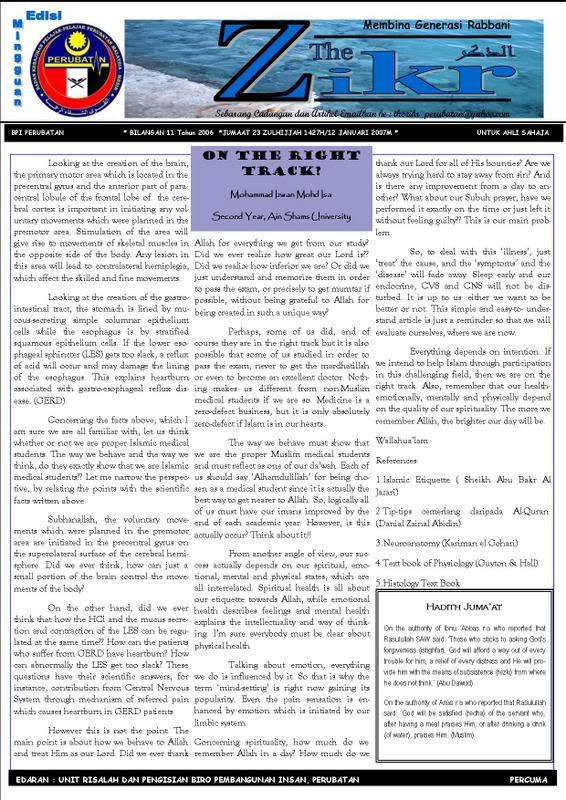ON THE RIGHT TRACK?
By : Mohammad Izwan Mohd Isa,Second Year, Ain Shams University
 Looking at the creation of the brain, the primary motor area which is located in the precentral gyrus and the anterior part of paracentral lobule of the frontal lobe of the cerebral cortex is important in initiating any voluntary movements which were planned in the premotor area. Stimulation of the area will give rise to movements of skeletal muscles in the opposite side of the body. Any lesion in this area will lead to contralateral hemiplegia, which affect the skilled and fine movements.
Looking at the creation of the brain, the primary motor area which is located in the precentral gyrus and the anterior part of paracentral lobule of the frontal lobe of the cerebral cortex is important in initiating any voluntary movements which were planned in the premotor area. Stimulation of the area will give rise to movements of skeletal muscles in the opposite side of the body. Any lesion in this area will lead to contralateral hemiplegia, which affect the skilled and fine movements.Looking at the creation of the gastrointestinal tract, the stomach is lined by mucous-secreting simple columnar epithelium cells while the esophagus is by stratified squamous epithelium cells. If the lower esophageal sphincter (LES) gets too slack, a reflux of acid will occur and may damage the lining of the esophagus. This explains heartburn associated with gastro-esophageal reflux disease. (GERD)
Concerning the facts above, which I am sure we are all familiar with, let us think whether or not we are proper Islamic medical students. The way we behave and the way we think, do they exactly show that we are Islamic medical students?? Let me narrow the perspective, by relating the points with the scientific facts written above.
Subhanallah, the voluntary movements which were planned in the premotor area are initiated in the precentral gyrus on the superolateral surface of the cerebral hemisphere. Did we ever think, how can just a small portion of the brain control the movements of the body?
On the other hand, did we ever think that how the HCl and the mucus secretion and contraction of the LES can be regulated at the same time?? How can the patients who suffer from GERD have heartburn? How can abnormally the LES get too slack? These questions have their scientific answers, for instance, contribution from Central Nervous System through mechanism of referred pain which causes heartburn in GERD patients.
However this is not the point. The main point is about how we behave to Allah and treat Him as our Lord. Did we ever thank Allah for everything we get from our study? Did we ever realize how great our Lord is?? Did we realize how inferior we are? Or did we just understand and memorize them in order to pass the exam, or precisely to get mumtaz if possible, without being grateful to Allah for being created in such a unique way?
Perhaps, some of us did, and of course they are in the right track but it is also possible that some of us studied in order to pass the exam, never to get the mardhatillah or even to become an excellent doctor. Nothing makes us different from non-Muslim medical students if we are so. Medicine is a zero-defect business, but it is only absolutely zero-defect if Islam is in our hearts.
The way we behave must show that we are the proper Muslim medical students and must reflect as one of our da’wah. Each of us should say ‘Alhamdulillah’ for being chosen as a medical student since it is actually the best way to get nearer to Allah. So, logically all of us must have our imans improved by the end of each academic year. However, is this actually occur? Think about it!!
From another angle of view, our success actually depends on our spiritual, emotional, mental and physical states, which are all interrelated. Spiritual health is all about our etiquette towards Allah, while emotional health describes feelings and mental health explains the intellectuality and way of thinking. I’m sure everybody must be clear about physical health.
Talking about emotion, everything we do is influenced by it. So that is why the term ‘mind-setting’ is right now gaining its popularity. Even the pain sensation is enhanced by emotion which is initiated by our limbic system.
Concerning spirituality, how much do we remember Allah in a day? How much do we thank our Lord for all of His bounties? Are we always trying hard to stay away from sin? And is there any improvement from a day to another? What about our Subuh prayer, have we performed it exactly on the time or just left it without feeling guilty?? This is our main problem.
So, to deal with this ‘illness’, just ‘treat’ the cause, and the ‘symptoms’ and the ‘disease’ will fade away. Sleep early and our endocrine, CVS and CNS will not be disturbed. It is up to us: either we want to be better or not. This simple and easy-to- understand article is just a reminder so that we will evaluate ourselves, where we are now.
Everything depends on intention. If we intend to help Islam through participation in this challenging field, then we are on the right track. Also, remember that our health- emotionally, mentally and physically depend on the quality of our spirituality. The more we remember Allah, the brighter our day will be.
Wallahua’lam.
References:
1.Islamic Etiquette ( Sheikh Abu Bakr Al Jazari)
2.Tip-tips cemerlang daripada Al-Quran. (Danial Zainal Abidin)
3.Neuroanatomy (Kariman el Gohari)
4.Text book of Physiology (Guyton & Hall)
5.Histology Text Book

No comments:
Post a Comment